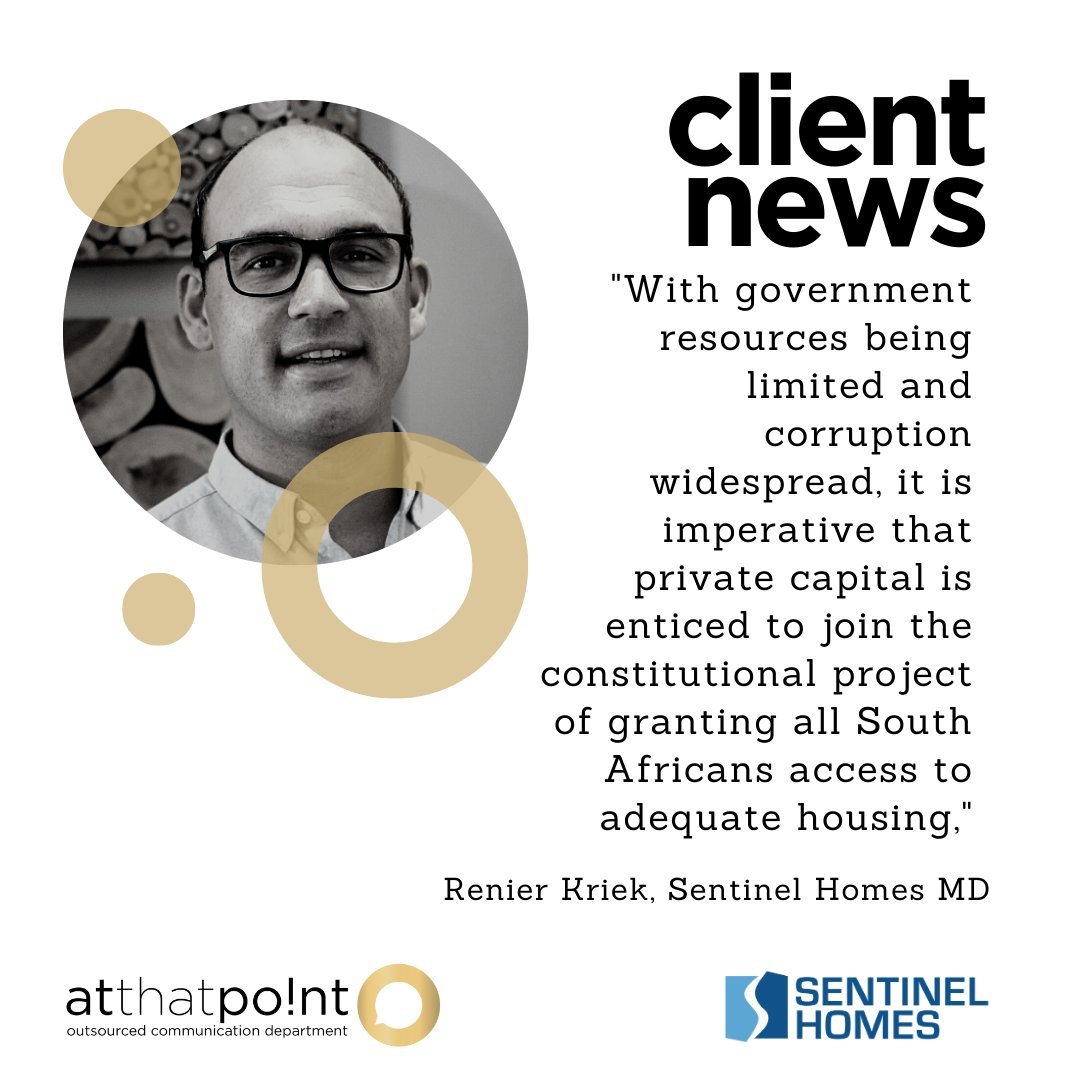|
Whether you’re buying property for business or to live in, you’re going to pay taxes at various stages of ownership.
“Owners - especially first-time buyers - need to be aware of their tax obligations and plan their property investments accordingly,” says Renier Kriek, Managing Director at Sentinel Homes. Unfortunately, tax is often overlooked, so here’s an overview of what you need to know. When you buy When you buy a property, you will either pay VAT or transfer duty, but never both. VAT is charged when a VAT-registered business sells a property, typically as a new residential development. Transfer duty, on the other hand, is levied when buying an existing residential property from its owner. Importantly, transfer duty cannot usually be financed through a home loan, so you’ll have to come up with the money yourself. On higher priced properties, transfer duty can run into the hundreds of thousands. “With a new property, VAT is included in the purchase price, so it is already covered by your loan,” says Kriek. “For first-time buyers, a new property can be much easier on their pockets.” It’s also important, when shopping for property, to keep in mind that new properties are cheaper at the same advertised price than their second-hand competitors, due to the impact of the transfer duty. For as long as you own Once you take ownership of your property, you’ll immediately start paying municipal taxes. Whereas transfer duty and VAT are paid over to SARS, municipal taxes are used to fund city services, infrastructure and salaries. “When planning to buy, you should consider how this tax will impact your monthly cash flow,” says Kriek. “We have, startlingly, had several clients who were surprised to learn that they will receive a monthly tax bill on their new home. The municipal tax is in addition to consumption charges for water and electricity and expenses like levies payable to the body corporate or homeowners’ association.” When you sell If you sell your property, you’ll pay capital gains tax (CGT). This is where things get a bit complicated. CGT is calculated on the difference between what you paid for a property and what you’re selling it for. Individuals are taxed on 40% of this profit at their marginal tax rate when it comes time to declare their annual income to SARS. However, if this is your primary residence (i.e. your home), the first R2 million of your profit is tax free. There are a few catches though. For example, perhaps you initially rented out the property but then moved in to live there permanently before selling it. In that case, the R2 million allowance must be divided proportionately between the period you rented it out and the period you lived there. And you won’t be able to claim that first portion as tax free. Another instance is where you claimed a deduction for a part of the property used for business, such as a home office. You will also have to subtract this part from the allowance. Trusts and companies, on the other hand, pay tax on 80% of their capital gains and don’t benefit from a primary residence allowance. This seems, on the face, to provide valuable incentives not to own your primary residence through an entity. However, the estate duty implication and the effect on the cost of administering your estate should also play into the consideration of the correct structure. Secondary properties, such as a holiday home, also don’t benefit, even if you do reside there occasionally. When you pass When you die, you will have to pay estate duty on the value of your estate above R3.5 million, rendered unto SARS by your estate administrator. Any property disposed of at this time will attract CGT, and the same exclusion allowance is applied to your primary residence. If your estate cannot cover your debt or tax obligations, your property may be sold to raise the necessary cash. There are several methods to protect your property against such a loss. You could take out extra life insurance to cover the tax liability. Or, you could sell your property to an estate planning vehicle, such as a trust or a company, at the earliest opportunity, in order to cap your eventual tax liability. Although you’ll pay CGT on the profit from that sale, any future property value increases will be on the balance sheet of the entity, not your own, thereby escaping an otherwise increasing estate tax liability. And since trusts and companies don’t die, you can avoid CGT in perpetuity when you do - to the advantage of your beneficiaries, of course. When you earn income If you earn income from any source other than employment, you must pay provisional tax. This includes income from renting out your property. Provisional tax requires that you estimate your non-employment earnings for the year and pay tax on half of those earnings at the end of August, with the balance due at the end of February in that tax year. When you declare your total annual income, any provisional tax paid during the year is deducted from your assessed tax. “Just estimating what you’ll earn in the coming year can be stressful and calls for the services of a professional tax advisor or accountant,” says Kriek. Starting out right The sheer complexity of tax on property and the methods of managing that obligation cannot be covered fully in a single article. For this reason, it is essential to carefully plan your property purchases around both financing and tax. “Especially for high value property investments, such as total property values exceeding R2 million, you definitely need to engage the services of estate management and tax planning professionals,” says Kriek. ENDS MEDIA CONTACT: Stephné du Toit, [email protected], 084 587 9933, www.atthatpoint.co.za For more information on Sentinel Homes please visit: Website: www.sentinelhomes.co.za Facebook: Sentinel Homes
0 Comments
The significant decline in the number of people who can keep their mortgage accounts up to date clearly illustrates the level of financial distress consumers are currently experiencing.
Historically around 92% of all mortgage accounts were up to date, but it has been dropping quite dramatically in recent times. The latest available figure shows it is down to 88% in the last quarter of 2023. That means home loan accounts with arrears have increased by about 50% recently, and it happened in the relatively short time span of 18 months to December 2023. Globally inflation has been quite stubborn and interest rates remain high as a result. In South Africa the repurchase rate (repo rate) of the South African Reserve Bank reached its highest level in 15 years, says Renier Kriek, managing director of Sentinel Homes. This means the prime rate, used to price home loans and other consumer debt like car loans and credit cards, is elevated. High inflation, and the high interest rate response, has been caused by a confluence of factors including the hangover from previous quantitative easing, supply-chain bottlenecks during the Covid-19 pandemic, the Russia-Ukraine war and the recent conflict in the Middle East. Despite earlier predictions that the high interest rate cycle could turn around in May this year it is now only expected next year due to high inflation proving stickier than anticipated. “Being unable to afford your home loan instalment is not a position anyone wants to find themselves in. Steer your own boat rather than leaving it to the vagaries of the foreclosure process. Not taking control of the situation can be financially disastrous,” advises Kriek. Prevention better than cure He urges homeowners to come to an agreement with their home loan credit provider before they miss the first payment. Stick to the arrangement. Do not over-promise and under-deliver. “If you couldn’t make an arrangement in advance of missing a payment, and you’ve already fallen into arrears, pay something toward the debt immediately. Just pay anything you can and keep on doing that as a launchpad for negotiations with your home financier.” Accounts that are receiving payments are less likely to face hand-over and foreclosure than accounts receiving no payments. “Do not let unreasonable hope be the enemy of your future financial well-being,” he adds. If the cause of your financial distress is unlikely abate within a reasonable time, call it a day and list the property for sale with an estate agent. Be realistic and pro-active. He recommends that distressed homeowners market their property before the home financier’s attorneys come knocking, ensuring a better return on the sale. “You will also avoid a slew of additional costs once the bank starts with the foreclosure process. These only serve to make your poorer, adding insult to injury.” Some people, particularly men in Kriek’s experience, tend to be too proud to discuss financial matters with family and friends. Many families are caught by surprise when there is suddenly talk about foreclosure, having missed the opportunity to assist along the road. “Reach out to the people you love and trust, there may be a lifeline from someone who will understand your circumstances and can assess the situation with much higher fidelity than a remote credit provider.” Forbearance before foreclosure Credit providers may be willing to assist a distressed homeowner by offering a payment holiday or by granting an interest-only period. It may also be possible to spread any existing arrears over a few months ‘repayments or extending the term of loan. This is especially true when the bar to payment is temporary, such as hospitalization or sudden retrenchment It is also important for consumers not to fall prey to over-enthusiastic debt counsellors. Many unscrupulous operators in that industry market debt counselling as a cure for all debt related ills. Entering debt counselling may not, in fact, save your home, but may still have a potentially disastrous effect on your future finances. For instance, debt review stops you from taking any new debt for several years while the debt review is completed. Kriek says there is a general misconception that home loans are “money-spinners” for home loan companies such as the banks. It only takes a couple of missed payments for home loan provider to be “under water” with a home loan. Do not labour under the misapprehension that you are doing the bank a favour by having a home loan with them – the home loan itself is not a very lucrative proposition. Nevertheless, the fixed costs of originating new home loans are quite high. Banks, home loan or credit providers generally prefer to rehabilitate existing customers rather than terminating the agreement, foreclosing, and then having to originate new debt. Take all opportunities to steer your own boat off the foreclosure rocks. Your finances cannot afford to be shipwrecked there. ENDS MEDIA CONTACT: Rosa-Mari Le Roux, [email protected], 060 995 6277, www.atthatpoint.co.za For more information on Sentinel Homes please visit: Website: www.sentinelhomes.co.za Facebook: Sentinel Homes The single woman’s guide to buying their first home
Almost 60% of South African homes are owned or co-owned by women, and women are increasingly buying property without a spouse or partner. “Many will be first-time buyers who are hesitant to commit because they feel they are unable to afford such an investment,” says Renier Kriek, Managing Director at Sentinel Homes. As someone who deals with single or unmarried property seekers regularly, Kriek offers some good advice to help you find the best way to finance your purchase. Rise of the female homeowner As modern family dynamics change, one demographic indicates that more than 40% of South African children now live with their mother only. This is greater than the number residing with both parents or another related adult. “Traditionally,it is believed that homeownership is one way to create the stable and secure setting that is conducive to childrearing. This cultural attitude, coupled with demographic changes, may explain the surge in women buyers,” says Kriek. Yet, buying a property on a sole income can be daunting for anyone, regardless of gender, especially since property prices have risen faster than salaries over the past 70 years. However, Kriek warns that once the practical results of the election have become clear and the long-anticipated interest rates cut has arrived, pent up demand will surely unleash a buying spree that sends property prices skyrocketing. Buying now, before the market rises, is probably preferable to buy now, especially for those buyers who must stand on their toes to buy a property in the first place, such as single men and women who only have the benefit of one income. “With the current buyer’s market, it is the ideal time to invest in a home that’s still affordable,” he says. Buying a home on a solo budget To find the best property, you first need to decide how you will pay for it. Here are some great tips to consider: Your primary concern is how much you can get together for your investment. This starts with an honest assessment of your financial position and credit record, since you will likely need to apply for a bond, which may require a substantial deposit. Then, do your research to discover alternative financing solutions. For example, the government’s First Home Finance subsidy offers qualifying applicants free financing that can be combined with other housing products, like mortgage loans. The options are out there, you just need to find them. However, don’t be tempted by shady loans that make getting into debt easy but whose crushing rates will eventually leave you penniless - and maybe even homeless. Next, implement sensible lifestyle changes. Now is a good time to start paying off lesser debts to free up disposable income and improve your credit rating. Also ask yourself which expenses you’re willing to live without, like your Netflix subscription or weekend takeaways. It all adds up. Ask your employer if they provide assistance with property purchases. For instance, some banks may offer certain staff home loans with low or no deposit, and some employers may offer formal or informal programs of assistance to those who wish to buy. Most importantly, be aware that every property comes with initial and monthly costs, some obvious and some hidden. Upfront, you’ll face transfer and registration fees, and transfer duty. Then, there are the ongoing and adhoc costs, such municipal costs, sectional title levies and consumption costs. You are also responsible for home maintenance and repairs, and other infrequent expenses that don’t normally affect renters. Make sure you work these into your calculations. Getting value from property Now, consider the best type of property to buy. Most single people prefer a lock-up-and-go home, like a property in a sectional title complex. Currently, sectional titles make up more than half of the properties in the country due to their excellent value-for-money proposition. For instance, they allow you to enjoy many of the benefits of a free-standing property, albeit in a communal setting. The cost of security, gardening, property maintenance, a swimming pool and entertainment areas, and more, is shared among owners, making these amenities affordable and accessible to each. “Given the demand, this is also the easiest property to sell when your lifestyle needs change, again making it the best for a first-time owner,” says Kriek. If your employer is open to you working remotely, or you can run your own business remotely, you may find better value in rural areas or the countryside. In such regions, your bond might be cheaper than your current rental, so keep an open mind. Also, determine if the property could somehow pay for itself. A granny flat or spare room that can be rented out for additional income certainly helps to ease bond repayments. Lastly, buy with the end in mind. One day, you may want to sell your starter home for the highest price you can get. To ensure its value keeps pace with the market, look at the basics most buyers demand, such as its proximity to schools, shops, hospitals, daycare and similar amenities. Also, try not to buy property in declining areas – low prices may in fact be a value trap. The rewards of due diligence As a single woman, who may also be a mother, your first home might seem like a distant dream, but it could be more affordable than you think. “As long as you are willing to do your homework, you might be surprised at what is possible and how soon you can have what you want,” says Kriek. ENDS MEDIA CONTACT: Rosa-Mari Le Roux, [email protected], 060 995 6277, www.atthatpoint.co.za For more information on Sentinel Homes please visit: Website: www.sentinelhomes.co.za Facebook: Sentinel Homes  This year, almost half of the world's inhabitants will head to the polls to elect their new governments, including 8 of the world’s 10 most populous countries. "In South Africa, we can expect our own election to put the property market into a temporary holding pattern, dragging on the subtle buyer’s market we have been experiencing" says Renier Kriek, Managing Director at Sentinel Homes. While he advises owners to wait until the end of the year to consider selling their property, Kriek cautions buyers to not get caught up in election fears and miss out on real estate bargains. The impact of sentiment All market behaviours are driven by sentiment. South Africans face uncertainty around the outcome of the election and the likelihood that, for the first time in its history, the country will be led by a coalition government at the national level. This creates negative sentiment that is also being fuelled by the heightened and increasingly populist rhetoric of competing political parties. And persistent factors, like the delay in interest rate cuts and a declining rand, only add to the doubt. "While we were all hoping for a downturn in the rate cycle at SARB's May or July meeting, I now doubt anything will happen before September. The MPC remains hawkish and seem unlikely to move interest rates down before the US Federal Reserve has lowered their policy rate," says Kriek. That's expected well after the election and these compounded concerns are pushing people to take a wait-and-see approach, including in the buying and selling of property. A first for South Africa All countries with a proportional representation electoral system eventually face a coalition government scenario. The likelihood of a national governing coalition is therefore a sign that our political system is maturing. This will be South Africa's first coalition government at a national level and the norms associated with such a structure have never been firmly established among the political class or the voting population. While national coalitions are a sign of progress and maturity, it is likely to lead to a lot of short- to medium-term noise, that is likely to have a continuing and unpredictable impact on sentiment in all markets, including the property market. The nearest we have to some agreement is the Multiparty Charter whose only purpose is to counter a national coalition between the ANC and EFF. Countries like Belgium with older proportional representation systems have developed the advanced bureaucracy necessary to almost run the country on autopilot, even without a government. South Africa, however, still needs to find its footing in any coalition pacts and develop the necessary protocols among participants intent on promoting their own interests. "This means things will probably be noisy and messy for some time after the election, as parties attempt to nail down the terms of their respective alliances," says Kriek. What to expect from property Currently, it's still a buyer's market for property and it definitely won't turn into a seller's market until after the election and a rate cut. Until then, we can expect that property price growth will remain low. Once the election outcome is known, and provided we have avoided worst-case scenarios, and the rate cut is at hand, we can expect pent-up demand for property to spill into the market and significantly increase demand. In addition, weak economic growth means sellers who can afford to wait should indeed wait until spring or summer to see if they can fetch a good price for their property relative to the market. Winter is historically not a great time for selling homes anyway. Despite the general modd brought on by politics and the interest rate cycle, the market in the Western Cape remains buoyant and there are signs of buyers returning in earnest to areas like southern Gauteng and areas eastof Pretoria. The smart money of property investors also remains in the market, signalling that opportunities exist. Along with low property price growth, this means that astute buyers can still pick up bargains while others hesitate. "If you want to buy, buy now and don't be put off by sentiment-driven hesitance that currently prevails in the market election sentiment," advises Kriek. “In the South African property property market, due to structural factors, what goes down must eventually come up.” ENDS MEDIA CONTACT: Rosa-Mari Le Roux, [email protected], 060 995 6277, www.atthatpoint.co.za For more information on Sentinel Homes please visit: Website: www.sentinelhomes.co.za Facebook: Sentinel Homes  There is a major surge in investment in buy-to-let properties across South Africa, with the Western Cape leading the pack. "We're seeing a 15 year high in national investment applications, which rose to 11.8 percent of all applications by the last quarter of 2023," says Renier Kriek, Managing Director at Sentinel Homes, who bought his first investment property at 19 and has been investing in residential property ever since. Usually, this figure is around 5 percent. Kriek is quoting recent ooba Home Loans market data which also puts investment applications in the Western Cape at a whopping 28.2 percent of total applications. "The housing demand in the province is enormous and property investors are obviously taking note," says Kriek. Investors, not home buyers Home buyers are hesitant to buy right now due to uncertainty around the upcoming election, as well as the rising cost of living caused by inflation and high interest rates. This could mean current data may be skewed by their lower participation, making investment applications appear greater as a percentage. Even so, it also indicates that property investors remain confident, active in the market, and resilient regardless of economic pressures. Property investment may also be seen as more secure in the current uncertain political climate. Why is property investment vibrant? One reason is the ongoing trend of semigration, with South Africans flocking to areas offering better infrastructure and service delivery. This is especially true of the Western Cape where new property development lags the influx of semigrants. Many coming to the province now rent while searching for a new home or while theirs is being built. Another reason is the return of tourists to Cape Town, still one of the top holiday destinations in the world. Investors are already snapping up prime properties they can rent out as short-term leases and holiday accommodations. The increased demand for rentals and improving performance in rental properties, including lower vacancies and tenant defaults, is driving the wave of buy-to-let investment applications. Tips for investors So, if people are serious about investment buying, does Sentinel Homes have any tips for them? "Indeed, we do," says Kriek.
New and experienced investors alike can benefit from Krieks advice. ENDS MEDIA CONTACT: Idele Prinsloo, [email protected], 082 573 9219, www.atthatpoint.co.za For more information on Sentinel Homes please visit: Website: www.sentinelhomes.co.za Facebook: Sentinel Home  The local property market will see a resurgence in 2024 predicts Renier Kriek, Managing Director at Sentinel Homes. "People have been held back from buying and selling property by various factors since before the COVID lockdown, but that is about to change for the better," he says. Factors impacting the local property market In South Africa, property buying and selling have dropped steadily since 2021. In 2023, market volume was about 5% lower than 2019. The factors driving this decline include load shedding, the national logistical backlog, a stalling economy, runaway inflation, the rising cost of living, and a 475 basis point increase in the lending rate since the COVID lockdown ended. However, people's life circumstances continue to change, suggesting pent up demand building below the surface. The number of first time buyers – a solid indicator of market demand – has also decreased significantly, again implying that unsatisfied demand exists. Outlook for 2024 Two main events signal that things are about to change. First, economists agree that, as inflation slows in South Africa, SARB will likely reduce the interest rate at its May or July National Planning Commission meeting in line with the US Fed. Second, the country will hold general elections this year, and probably be led for the first time by a coalition government at national level. While this might concern South Africans, it also promises to bring new energy to solving the nation's dilemmas. Kriek believes both these events will turn out well and will provide a release for the evident demand for property. "Then, we'll see a dramatic increase in market activity," he says. Several lesser trends are also worth watching. Smart money in the market Right now, there's a lot of smart money in the market – entities that buy properties to boost their portfolios, not their lifestyle. Interest rates on mortgage loans have decreased significantly, partly because banks are competing for a shrinking market, but also because these investors are richer, have better credit records and present a much lower risk than the average buyer. They are also paying higher deposits up to 105 percent. In the same vein, wealthy buyers from abroad are snapping up luxury properties in Cape Town above R20 million. This trend is sure to continue into 2024 as that smart money looks to acquire more assets before the market turns. Semigration Semigration remains a major trend in 2024 and smaller towns will continue to be targeted for gentrification, no longer only in the popular Western Cape but across the country. As more affluent buyers seek stock in these locations, incumbents will see their property value rocket. This may not be the only incentive for them to sell, though. Increases in rates and the cost of living may become unaffordable for them, pressuring them to move elsewhere. But where will they go? With more than 80 percent of all building plan approvals being in coastal areas currently, the answer is plain to see. Co-buying There is a marked increase in co-buying, that is, people buying a property together with someone other than their spouse. This includes friends, unmarried couples, investors and those with business intentions. About one in every four properties purchased is now co-bought. This approach overcomes the gap between property prices and income, and is a way for younger people to enter the market while spreading risk between them. Banks have also changed their policies to accommodate co-buying, with some allowing up to 12 individuals to join in the application. Buy-to-let boom The buy-to-let market is booming, especially in the Western Cape. One reason is that, due to insufficient stock and higher property prices at the coast, many semigrants rent while they shop around for an affordable property or while their new home is being built. This growing demand provides a good incentive for buy-to-let landlords to invest in new homes and apartments, despite the high construction costs. Almost 11% of all bond applications are currently investment purchases. Smaller properties Another continuing trend in 2024 will be smaller plots and smaller properties. High construction costs make it very difficult to create new stock that competes with existing stock in the market. So, both tenants and buyers will have to adapt to reduced living space unless they can afford to build their own at a premium. Relief for homeowners The number of buyers may be low but owners are also holding onto their properties for dear life, in the face of crippling interest rates. Unfortunately, foreclosure may have forced some to sell. Yet, the predicted drop in interest rates promises relief to those who managed to stay afloat. It could also mean an influx of buyers for anyone who desperately wants to unburden themselves of their property. When will the change happen? Kriek expects the dam to break in the coming winter. This is not a prime time for property sales, however, especially in the Western Cape. During this season, people tend to buy fewer properties or buy them at a reduced rate. "With lower transaction volumes during the winter months, there is likely to be a slight buyer's market that will turn to a seller's market in spring," he says. ENDS MEDIA CONTACT: Rosa-Mari Le Roux, [email protected], 060 995 6277, www.atthatpoint.co.za For more information on Sentinel Homes please visit: Website: www.sentinelhomes.co.za Facebook: Sentinel Homes  Everyone buying a home would like to know that they are getting good value for money. Buying a property that is good value for money is not easy but is achievable for those who are astute and are willing to be patient and remove as much emotion from the decision as possible. The first important mindset shift is that buyers must not confuse value with price. “Just because you were able to negotiate a reduction in the asking price does not make it a bargain. The price likely was inflated to begin with, because there are many incentives favouring higher listing prices,” says Renier Kriek, Managing Director of Sentinel Homes. True bargains have some distinguishing characteristics to look out for. This includes:
Home seekers on the lookout for a bargain must remain alive to illegal construction. “The risk associated with illegal building work is almost always not worth the discount on the price,” says Kriek. If there are any doubts about the structural integrity of a building, call in the professionals to do an inspection. The benefit of a qualified home inspector, especially to inexperienced buyers, cannot be overstated. Since kitchens and bathrooms are the most expensive parts of any residential properties carefully consider the conditions of these two areas. More sage advice from Kriek is to avoid bargains close to open public spaces. These areas tend to devalue property if they are not well maintained by local authorities. ENDS MEDIA CONTACT: Rosa-Mari Le Roux, [email protected], 060 995 6277, www.atthatpoint.co.za For more information on Sentinel Homes please visit: Website: www.sentinelhomes.co.za Facebook: Sentinel Homes If you do not want to receive emails from us, please use the link: Click here to unsubscribe.  A path to financial security is home ownership. Since there is no rule saying your first property must be a home to live in, you have the freedom to buy the home you can afford as the best way of getting started. Asset prices have escalated much faster than wage increases over the past 70 years and that trend is likely to continue. This simply means that homes are becoming less affordable, says Renier Kriek, MD of Sentinel Homes, a non-bank home loan provider. “If the trend of decoupling asset and wage prices is going to continue the best bet is to get into the property market sooner rather than later. Particularly when there are so many bargains to be had.” First time home buyers are progressively becoming older because of affordability. It has moved from around 30 to 32 years to around 38 to 40 years. “You must get in earlier to buck this trend. If you wait until the time you can afford your dream home you may never be able to achieve that goal.” It is now a buyer’s market. Kriek explains that South Africa is coming off from a high-inflation-high-interest-rate cycle. “Inflation has become a more manageable beast, and market watchers are starting to predict a decline in interest rates next year.” Time the market Unfortunately, very few people act until they see the first rate cut. By then the cat is out of the bag and the market will change quite rapidly. “If you want to time the market you have to buy now.” Kriek says first time buyers who can afford to acquire a real estate asset at current interest rates will likely be able to afford it through the cycle; and they are unlikely to purchase a property they can’t afford. “The ugly duckling may be a better start than the shiny house on the hill.” He also suggests that prospective buyers use a bond originator to get prequalification for a home loan. “It shows that you are a serious purchaser, which makes everyone so much more willing and able to help.” Real estate, whether it is your own home or an investment property, comes with expenses and tax consequences. However, if you do not want to live from wage-to-wage for the rest of your life then some sacrifices are called for to enter the property market. “Every goal has some sacrifices and the sacrifices for financial goals are of the living standard kind. If you want to truly benefit from asset ownership you will have to suffer some short term discomfort. That is reality.” Take the leap Owning inflation-beating assets, like residential real estate in the correct areas and markets, is generally a good idea. Kriek has 19 years of property investment experience. His advice:
ENDS MEDIA CONTACT: Rosa-Mari Le Roux, [email protected], 060 995 6277, www.atthatpoint.co.za For more information on Sentinel Homes please visit: Website: www.sentinelhomes.co.za Facebook: Sentinel Homes  Overregulation of the housing market in South Africa is discouraging the private sector from investing in formal low-cost housing projects. This is according to Renier Kriek, Managing Director at Sentinel Homes. "With government resources being limited and corruption widespread, it is imperative that private capital is enticed to join the constitutional project of granting all South Africans access to adequate housing," he says. It is apparent that, for all the government's initiatives, programmes and subsidies to provide RDP housing, a vast number of underprivileged citizens still reside in informal settlements. However, while tax breaks exist for new or improved rental housing, with added incentives for low-cost housing, the rest of the legal and policy landscape is much less persuasive to investors. Mortgage risk For one, housing consumers who earn less than R15,000.00 per month make up less than 0.6 percent in value and 1.7 percent in number of accounts granted mortgages in Q1 2023, matching a decade long trend. This is because banks tend to avoid these riskier applicants, even when supported by the government's Finance-Linked Subsidy Programme (FLISP). The reason is simple: the excessively long and inefficient foreclosure process in South Africa seems bent on ensuring losses for both banks and defaulting consumers. In addition, judges are often overly sympathetic to defaulting debtors per case, not considering the overall negative effect this has on banks' attitude towards financing the larger underprivileged community. "However, if the cost of terminating defaulting mortgages were low, banks would be less risk averse, thereby increasing the likelihood of access by this segment," says Kriek. Rental risk Similar to mortgages, the time and financial costs of eviction are too high, and the law and courts too lenient on defaulting renters. With the supply of formal housing being so low, the cost of eviction should also be low and the rights of a large number of potential tenants should weigh more heavily than those of a few non-paying tenants. "If the risk was low, more landlords would emerge to invest in satisfying the obvious demand for affordable accommodation," says Kriek. Development rules Lastly, housing development in South Africa is inhibited by long or delayed regulatory processes, as well as building standards designed around first-world circumstances. This is further exacerbated by municipal inefficiency, which affects delivery of essential services like roads, water, power and sanitation. Authorities have also suddenly become deeply concerned with the lack of affordable housing. Their response has been to request that developers include affordable housing units in new developments, even in areas not marked for such housing. "While laudable at first glance, this does not increase the availability of affordable housing as beneficiaries will often flip the unit at market price to realise a profit," says Kriek. The positive intent is therefore negated and leaves the market worse off. Change Is Needed Mortgage risk, rental risk and misguided development rules, taken together, disincentivise the development of low-cost housing in favour of larger, pricier units. "Given the state of the country’s housing market, urgent legal reforms and business-friendly policies are needed to ensure all South Africans gain access to constitutionally mandated housing," says Kriek. ENDS MEDIA CONTACT: Rosa-Mari Le Roux, [email protected], 060 995 6277, www.atthatpoint.co.za For more information on Sentinel Homes please visit: Website: www.sentinelhomes.co.za Facebook: Sentinel Home  South Africans who have been hesitating to buy a new home due to high interest rates may finally be able to take the plunge. "For the first time since April 2022, the Consumer Price Index (CPI) has fallen back within the Reserve Bank’s target band of between 3-6 percent," says Renier Kriek, Managing Director at Sentinel Homes. According to Kriek, a lower CPI indicates that inflation has potentially peaked. This will likely mean stabilization of the market interest rates and a repo rate reduction could even be on the way. Signs that inflation is falling Since the disruption to world economies caused by COVID-19, several factors subsequently contributed to high global inflation, from which South Africa was not spared. Inflation often occurs because the difference between consumer demand for items and producers' ability to supply them causes their prices to increase too sharply to remain affordable. It may also result from a drop in the relative purchasing value of money due to various economic factors. Inflation in South Africa is measured through the Consumer Price Index (CPI) compiled by Stats SA. The South African Reserve Bank (SARB) follows a policy of keeping any changes in the CPI within a range of 3 to 6 percent year-on-year, preferring to keep it anchored at 5 percent. Even before local CPI breached 6 percent earlier last year, SARB moved to reign in inflation with 10 consecutive increases in the repo rate, to the current level of 8.25 percent. Interest rates consumers are charged on their debt, such as the prime rate, are linked to the repo rate. This means that rises in the repo rate makes repayments on debts like home, car and personal loans more expensive, forcing consumers to curb non-essential purchases and bringing rampant price increases down. However, on 21 July 2023, the SARB's Monetary Policy Committee announced the repo rate would stay unchanged at 8.25 percent, saying it remains cautious. The main reason a further increase was avoided is the drop in the CPI from almost 7 percent in April to only 5.4 percent in July. The July CPI was even lower than what economists predicted. "For consumers, this means that, barring unforeseen increases in inflation, the repo rate will remain steady and might even be reduced in September, when the Committee meets again," says Kriek. Are there homes to buy? The South African economy created 1.2 million new jobs between the first quarter of 2022 and the first quarter of 2023, despite challenges like inflation, loadshedding and poor service delivery. If the repo rate drops as expected, this will put even more money in people's pockets and boost economic activity. In short, things are looking up for South Africans, especially those with their hearts set on buying a home. Although estate agents report a shortage of stock from resilient homeowners desperate to keep their properties, home loan debtors are clearly facing heavy stress from current high interest rates. The National Credit Regulator reports that while the number of mortgages not in arrears are usually around 91 percent of total home loans, the first quarter of 2023 saw a drop to 88.85 percent. The arrears rate has steadily increased as interest rates climbed higher. "Banks will likely be eager to help owners in arrears with payments start the process of selling those properties, meaning we are likely to see increased stock coming onto the market soon,” says Kriek. “The normal stock cycle in the property market will also return if sellers see positive signals, such as stagnation or decline in interest rates. Until that time, sellers are likely to hold out on selling as much as they can to avoid being price takers.” Is it time to buy? Of course, the best time to buy depends on various factors and conditions, changing from region to region, case to case and price range to price range. However, Kriek says for anyone set on semigrating from the northern provinces to the Western Cape or elsewehere on the coast, the time is ripe to buy and they should not wait. Properties selling against home loan debt typically carry an average sales value of around R1.3 million. Properties at this price point and anything below the average price have seen and will continue to yield a respectable return on investment. “Demand very clearly outstrips supply for properties priced below the average,” says Kriek. The exception is properties in the very high range, above R4 million. "I see evidence that prices will come down further so it may be best for prospective buyers in that price range to bide their time until the market bottoms out,” says Kriek. “Of course, there are exceptions, such as Sea Point or Stellenbosch.” Lastly, Kriek advises that, with interest rates having peaked, purchasers should opt for a variable interest rate instead of a fixed interest rate. "Homeowners taking advantage of the eventual drop in the repo rate can enjoy their property while reducing their bond repayments," he says. ENDS MEDIA CONTACT: Rosa-Mari Le Roux, [email protected], 060 995 6277, www.atthatpoint.co.za For more information on Sentinel Homes please visit: Website: www.sentinelhomes.co.za Facebook: Sentinel Homes |
Welcome to the Sentinel Homes Newsroom. BROADCAST INTERVIEWS2023 Archives
July 2024
Categories
All
|




 RSS Feed
RSS Feed